What Is the Difference Between Guinea Pig Breeds in Lifespan?
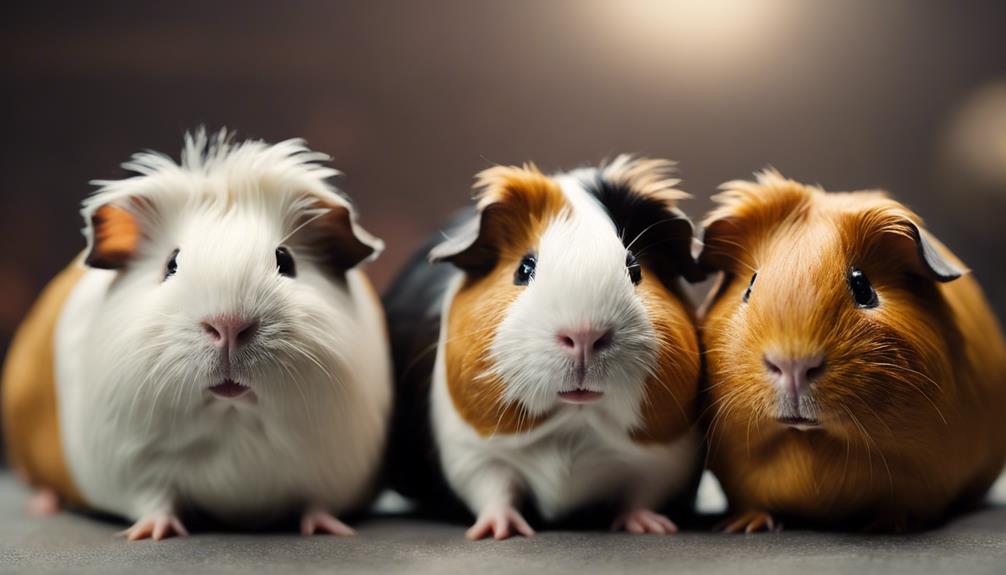
Guinea Pig Breeds: Understanding Lifespan Differences.
Guinea pig breeds have varying lifespans due to genetic factors, with averages ranging from 5 to 7 years.
Lifespan Variation Among Guinea Pig Breeds
Among various guinea pig breeds, differences in lifespan can be influenced by genetic predispositions and breeding practices. While the average lifespan of a guinea pig typically ranges from 5 to 7 years regardless of breed, exotic breeds may face genetic issues that impact their longevity.
For example, American guinea pigs are often observed to be healthier compared to some other breeds, suggesting a potential genetic advantage. Additionally, exotic breeds may have predispositions to specific health conditions, further affecting their lifespan. Observations also indicate that breeding practices play a crucial role in determining the overall health outcomes of guinea pigs, highlighting the importance of responsible breeding to promote longevity and well-being.
Factors Influencing Breed-Specific Longevity
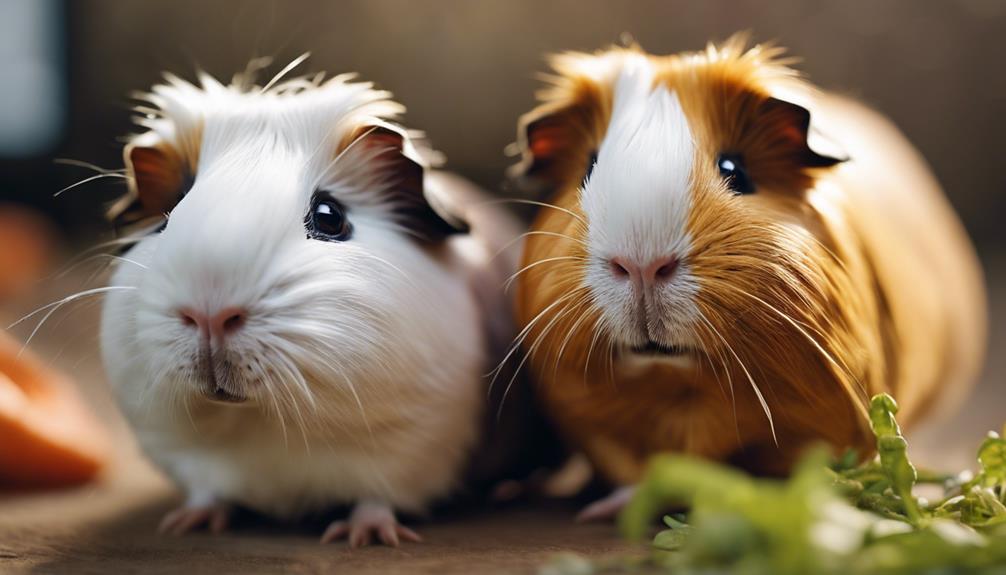
Genetic predispositions, dietary habits, environmental conditions, and healthcare practices all play crucial roles in determining the lifespan of different guinea pig breeds. When considering factors influencing breed-specific longevity, it's essential to delve into the specifics:
- Genetics: Each guinea pig breed has unique genetic traits that can impact its lifespan. Some breeds may be predisposed to certain health conditions that could affect longevity.
- Diet: The food guinea pigs consume directly impacts their overall health and lifespan. Providing a balanced diet rich in essential nutrients is vital for promoting longevity.
- Environment: Guinea pigs thrive in stress-free environments with adequate space, proper bedding, and suitable temperatures. Environmental stressors can negatively impact a guinea pig's lifespan, with breed-specific variations.
Breed-Specific Health Considerations
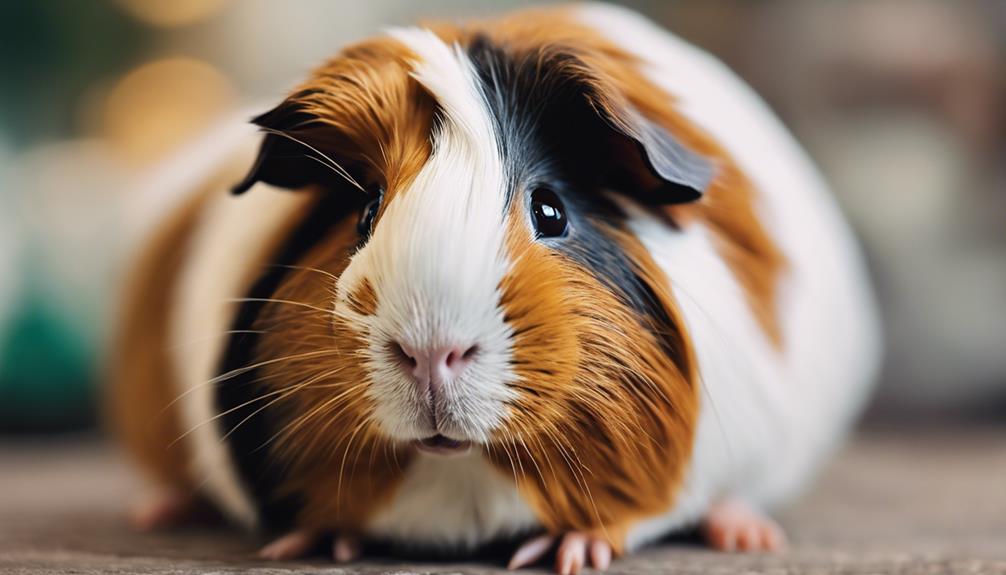
When considering the health of specific guinea pig breeds, it becomes evident that certain factors, such as breed origins and breeding practices, significantly impact their overall well-being and longevity. Some guinea pig breeds, like Americans, tend to be healthier compared to exotic breeds due to differences in genetic health issues and breeding practices. Exotic breeds may have specific genetic health issues that can affect their longevity, while observations suggest that certain breeds may have predispositions to particular health conditions. Breed-specific health considerations are crucial when assessing the well-being and potential lifespan of guinea pigs. Breeding practices play a significant role in determining the overall health and longevity of these pets. Below is a table highlighting some key breed-specific health considerations:
| Breed-Specific Health Considerations | Genetic Health Issues | Breeding Practices |
|---|---|---|
| Americans | Few | Standard |
| Exotic Breeds | Common | Varied |
Longest-Lived Guinea Pig Breeds
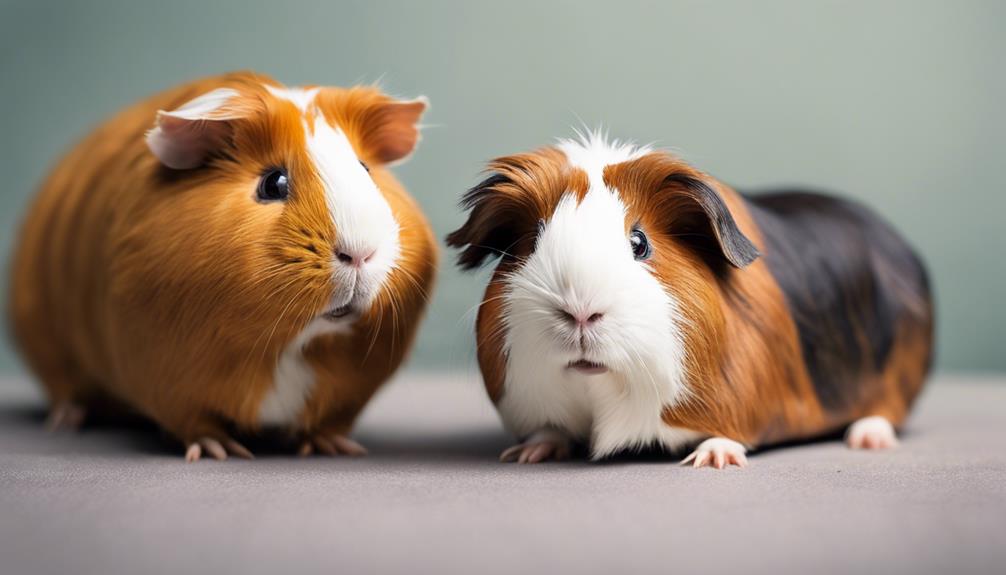
Long-lived guinea pig breeds, such as Americans, have an average lifespan of 7-10 years. When considering the longevity of guinea pig breeds, Americans stand out for their extended lifespan compared to other breeds. Here are some key points to understand about the longest-lived guinea pig breeds:
- Americans: Known for their robust health, Americans tend to live longer due to their genetic makeup and overall hardiness.
- Health Comparisons: Exotic guinea pig breeds may face more health challenges that can impact their lifespan, making them generally shorter-lived than Americans.
- Genetic Issues: Exotic breeds often have genetic issues that can affect their overall health and longevity, highlighting the importance of responsible breeding practices.
When choosing a guinea pig breed, considering the potential lifespan is crucial. By opting for longer-lived breeds like Americans, pet owners may enjoy more years of companionship and fewer health concerns related to genetic issues commonly seen in exotic breeds.
Shortest-Lived Guinea Pig Breeds

Among guinea pig breeds, some are notably shorter-lived due to specific health factors. Exotic breeds, such as the Baldwin, are known for their genetic health issues that contribute to their shorter lifespan. The Baldwin guinea pig, in particular, stands out as one of the shortest-lived breeds due to its predisposition to certain health conditions. These specific health conditions impact their longevity compared to other guinea pig breeds.
| Breed | Genetic Health Issues | Lifespan |
|---|---|---|
| Baldwin | Prone to genetic health issues | Short-lived |
| Abyssinian | Generally healthy breed | Moderate |
| Texel | May have coat-related concerns | Moderate |
The Baldwin guinea pig breed, characterized by its unique appearance, unfortunately, faces challenges in terms of lifespan due to its genetic health issues. While some guinea pig breeds like the Abyssinian and Texel are generally healthier and enjoy a more moderate lifespan, the Baldwin's breed-specific health concerns contribute to its shorter longevity.
Breeds Prone to Age-Related Issues
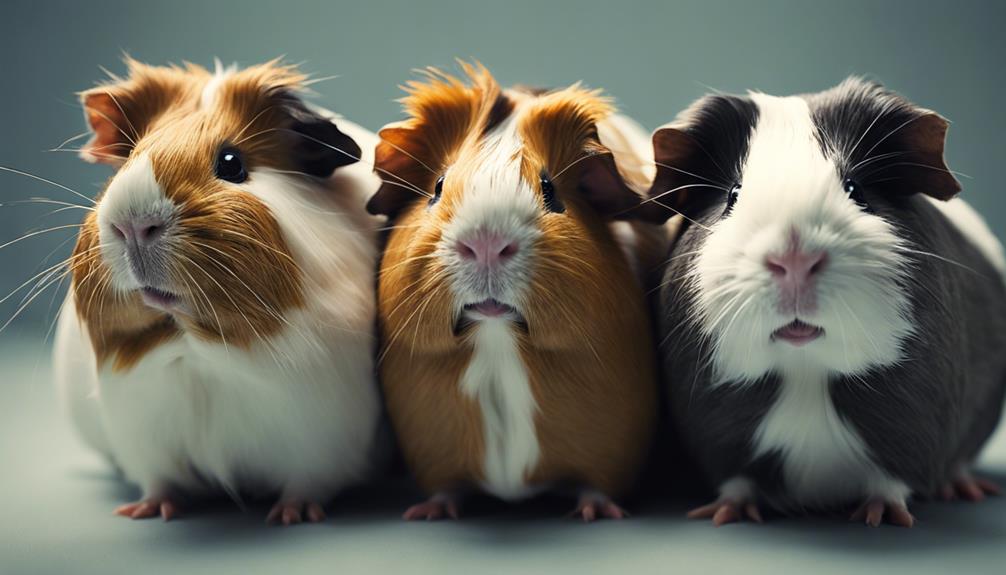
Certain guinea pig breeds, such as Skinny guinea pigs, exhibit a predisposition to age-related issues due to their unique genetic makeup. These breeds are more prone to developing health conditions as they age, requiring specialized care to ensure their well-being. Here are some key points to consider:
- Genetic Mutation: The hairless trait in Skinny guinea pigs is a result of a genetic mutation that not only affects their physical appearance but also increases their susceptibility to certain age-related health issues.
- Age-Related Issues: Skinny guinea pigs may experience a higher incidence of age-related problems compared to other breeds, necessitating regular monitoring and proactive veterinary care to address these issues promptly.
- Specialized Care: Owners of Skinny guinea pigs should be knowledgeable about the specific health concerns associated with their breed and provide the necessary specialized care to mitigate the impact of age-related issues on their pets' quality of life.
Strategies for Prolonging Breed Lifespan
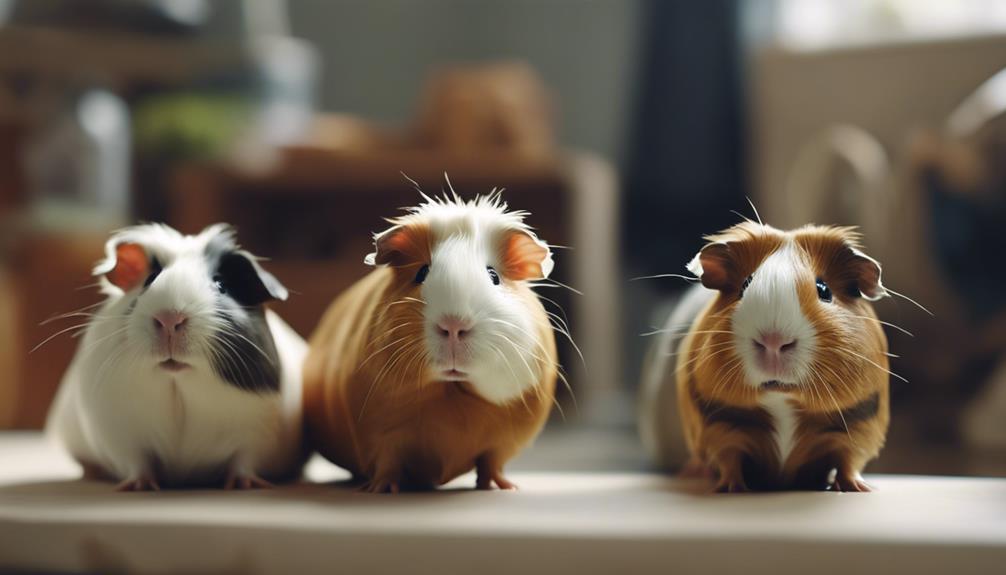
To enhance the lifespan of guinea pig breeds, it's essential to prioritize a balanced diet, proper housing, and regular veterinary care. These foundational aspects are crucial for promoting overall health and longevity in guinea pigs, regardless of breed.
Genetic predispositions in exotic breeds may lead to specific health conditions affecting their lifespan, highlighting the importance of early detection and specialized care. Breeding practices also significantly influence the health outcomes and lifespan of different guinea pig breeds. Selective breeding for desirable traits should be coupled with an emphasis on genetic diversity to mitigate the risk of hereditary health issues.
Additionally, implementing good care practices, such as minimizing stress and providing a suitable environment, can help guinea pigs live closer to their average lifespan across breeds. By integrating these strategies into daily care routines, guinea pig owners can play a proactive role in extending the lifespan and enhancing the well-being of their beloved pets.
Frequently Asked Questions
What Guinea Pig Breed Lives the Longest?
Long-haired guinea pigs typically have a shorter lifespan of around 4 years, while Skinny guinea pigs live longer, averaging 7-8 years. Health factors, genetic influences, environmental impact, and care differences all play roles in breed longevity.
Can Different Breeds of Guinea Pigs Live Together?
Different guinea pig breeds can live together harmoniously if introduced properly. Their compatibility, social dynamics, housing needs, and health considerations play crucial roles. With supervision, mixed-breed groups can thrive, showing remarkable behavioral adaptations.
What Are Some Facts About Guinea Pigs Life Span?
Guinea pigs' lifespan ranges from 5-7 years, with some living up to 10 years with proper care. Genetics, diet, and living conditions affect lifespan. Signs of aging include reduced energy and age-related illnesses.
Do Boy Guinea Pigs Live Longer Than Girls?
In the realm of guinea pig lifespans, gender differences play a minimal role. Lifestyle factors, genetic predisposition, average life expectancy, and health care practices are more influential. Both boys and girls require proper care for a healthy, long life.











